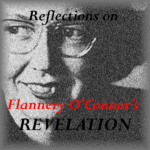Free Revelation, and a Poetic entrée to Holy Week…

As an Easter gift to those who find our work of interest we are offering to everyone stopping by our website the opportunity to listen to an MP3 audio file of Gil Bailie’s Reflections on the Flannery O’Connor’s Short Story – Revelation by clicking on the streaming audio player below:
For those not already on our email list – Please sign up for our occasional email newsletter (~4 x per year) to receive notice of future discounts and complimentary items from our audio archives. Click HERE to sign up. (You may unsubscribe at anytime.)
As we prepare to enter Holy Week our attention is drawn toward the Paschal Mystery – and away from the those daily tasks that so incessantly occupy our time and energy. In characteristically poetic fashion Gil Bailie, below, offers us an entrée into these days of interior reflection as we find ourselves among the crowds following Jesus into Jerusalem:

Of one of my favorite poets, T. S. Eliot wrote: “Edwin Muir will remain among the poets who have added glory to the English language. He is also one of the poets of whom Scotland should always be proud. But there is, furthermore, it seems to me, something essential which is neither English nor Scottish, but Orcadian.” [The people of the Orkney islands off the northern coast of Scotland draw on a unique ancient heritage.] “There is [in Muir’s poetry] the sensibility of the remote islander, the boy from a simple offshore community plunged into the sordid horror of industrialism in Glasgow, who struggled to understand the modern world of the metropolis in London, and finally the realities of central Europe in Prague where he and his wife saw the iron curtain fall.”
Eliot’s assessment is confirmed in Muir’s poem The Incarnate One, which seems to me germane to both the world historical moment in which we live and to the drama of Holy Week which we are poised to enter. The poem has something of the foreboding of Matthew Arnold’s Dover Beach, with its “eternal note of sadness” at the “melancholy, long, withdrawing roar” of the sea of faith. Unlike Arnold’s sense of wistfulness, however, Muir’s faith survives his disappointment with the harsh Calvinist Christianity into which he was born. Both his sober assessment of the historical circumstances of his time and his confidence that no recrudescence of paganism or decent into nihilism will long eclipse the Christian truth seem appropriate as well to our time. It also evokes something of René Girard’s understanding of Christianity and – if I may say so – it has a resonance with some of what I wrote in God’s Gamble and in my forthcoming essay in Communio: International Catholic Review entitled: “Making Peace Through the Blood of His Cross.”
Muir was roughly contemporary with G. K. Chesterton, and The Incarnate One ends on a Chestertonian note, but it begins with the rejection of the doctrine of predestination:
The Word made flesh here is made word again,
A word made word in flourish and arrogant crook.
See there King Calvin with his iron pen,
And God three angry letters in a book,
And there the logical hook
On which the Mystery is impaled and bent
Into an ideological instrument.There’s better gospel in man’s natural tongue,
And truer sight was theirs outside the Law
Who saw the far side of the Cross among
The archaic peoples in their ancient awe,
In ignorant wonder saw
The wooden cross-tree on the bare hillside,
Not knowing that there a God suffered and died.

